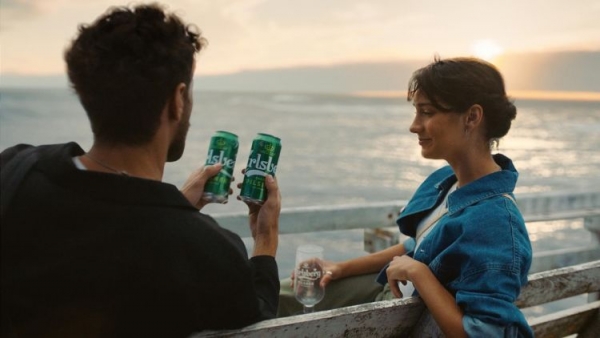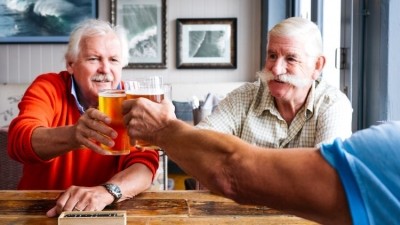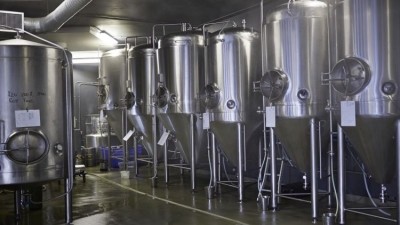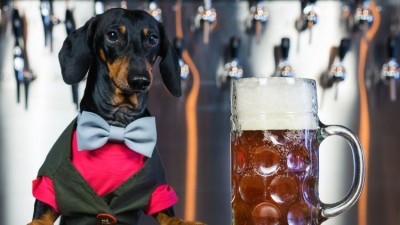Big Interview
Carlsberg Marston's Brewing Company celebrates first year of merger
This content item was originally published on www.morningadvertiser.co.uk, a William Reed online publication.
On the history of how the two businesses decided to merge, Davies explains there was “an ambition to bring the biggest cask brewer in the market together with a very strong lager portfolio as well as bringing different cultures and aspects together” and once the initial plans were put into place he took on the role of CEO.
Davies was living and working in Poland for Carlsberg and, almost 10 years to the day after leaving a job at Carlsberg UK, he was given “the amazing task” of returning to the lead role at CMBC.
And although the business is celebrating a successful first year, the merger has not been without difficulties. He says: “The challenges have been vast, let’s be very transparent with one another, we were bringing together two amazing companies with different cultures, different brand portfolios and different ways of working, and in a normal integration this would be challenging, but actually doing it in the middle of Covid when the business was effectively locked down, and the desperate situation for our on-trade partners and customers meant was even more challenging.
“But due to the hard work and energy of thousands of colleagues we're still on track with what our original plan was prior to the arrival of Covid. For around five months of my role, I never met my leadership team due to following UK Government Covid guidelines. All of the transition work, defining the projects, some of the IT infrastructure, some of the unfortunate restructuring of our commercial function was done remotely through Teams and it astounded me what we have achieved as a business during the first year in this company. It's been amazing.
“Of course, there are always some bumps when you set up a five-year plan to bring together two great businesses but we're on track and the integration is going very well.”
Davies adds the advantages of the merger has not been that one great company has been formed but the sum of its parts makes it even stronger. He says: “The proposition is about bringing two great businesses together and it’s not that one plus one equals one, it’s actually one plus one equals three. It’s the best of both that is creating a stronger, more sustainable business and being a real leader in the UK brewing industry.
“The first thing is we are trying to create a deeper, broader, more attractive portfolio for our customers in the on-trade and our partners in the off-trade. And I think we achieved that by blending global and local brands in lager but equally we have the leading cask portfolio in the UK with some magnificent brands like Wainwright, Hobgoblin, the list goes on."
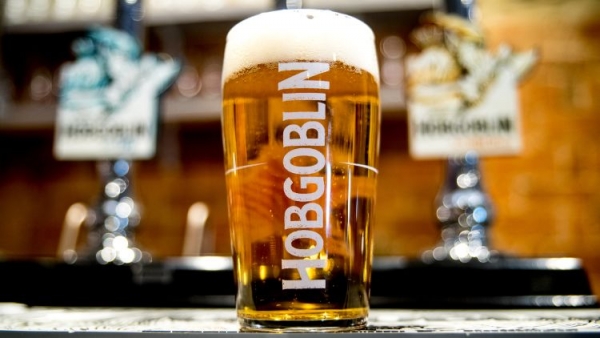
He continues: “The second bit is around our service proposition. We continue to invest in strengthening, for example, our route to market. We are moving all of our secondary logistics operation in-house. We've had a great partnership with DHL but from March next year have our business in-houses. We think there’s a real competitive advantage in the marketplace from having our dray crews calling on our customers. There’s a very strong competitive advantage for us that we are investing heavily in with new depots, new people, new trucks. And it's a real vote of confidence, both in CMBC, but also in the UK on-trade industry.”
Online ordering strong
He states the move will create the largest logistics network dedicated to the on-trade operated by a brewer in the UK with investments being made in new depots in Cardiff, Runcorn and one in the south-east, which will create about 200 jobs. Also, an investment in more than 100 new HGV vehicles and vans will see a higher fuel efficiency than in its current fleet.
“We’re really investing in our people by trying to strengthen the systems that they are operating with and building a combined culture. There are many fantastic attributes from the Marston’s family that we need to now build into this new culture of a business,” he adds.
Davies is keen to point out other initiatives such as a heavy investment being made in e-commerce, particularly in online ordering platforms after finding an increasing number of on-trade customers ordering beer.
Meanwhile, challenges in the form of recovery from Covid, supply issues including a lack of CO2 and a shortage of HGV driver means CMBC is not one of many businesses still in need of Government support.
“We have certainly weathered the storm better than most in the industry in terms of providing the right kind of service for our customers,” states Davies. “But supply-side challenges pop up constantly. We've also become pretty strong in crisis management because these issues suddenly come very fast at you as an industry. We've got very much used to adjusting our business model and our resources to dealing with live issues like CO2.”
Supply inputs such as ingredients or packaging are sourced within the UK so Brexit has not proved to be a major problem for CMBC. However, as a wholesaler of wine, the business has suffered somewhat because it has been more difficult to bring it into the UK, and CMBC is being affected indirectly because pubs, its on-trade customers, are suffering from a well-documented staffing shortage.
As Christmas creeps ever closer, the business is preparing for a return to a more normal Christmas by working with its customers in all channels to make sure it has stock available. “I think there is some uncertainty but, in general, there is optimism within the on-trade, in particular, about this Christmas,” Davies says.
“We just have to watch how the infection rates around Covid will move. Certainly, in the past couple of weeks, the trend has turned somewhat and we may see some form of government intervention within England. That may be challenging, but we're ready for Christmas. We're talking to all of our customers, they're generally excited and optimistic about Christmas, so we're certainly going to deliver what we need to this Christmas.”
On the subject of the Autumn Budget, Davies would not be alone in describing what CMBC would like to see from the Government. He says: “We're in a symbiotic relationship with our customers in the trade so what what's good for them is good for us, specifically around alcohol duty – we don't expect or we don’t wish to see any significant changes. This has been a very difficult year for our industry and dramatic changes in the duty system would be not good for us.
“In terms of the Chancellor, we would like him to permanently reduce rate of VAT to help boost the economic recovery of both the brewing and hospitality sectors. And we would also call for an extension of the business rates, support for pubs until 22 April, or even beyond.
“The industry has been hit hard. It’s recovering, it’s dynamic, it's agile, but we really need the government to continue to support us.”
Environmental matters
Environmental matters are also a big issue for a big company and one of its recent initiatives has been the use of ‘snap pack’ packaging, which has meant the removal of plastic rings to hold multipack cans of beer and have been replaced by small dots of glue that seal packs together, which allow the purchaser to break cans off individually.
“From an environmental perspective, in terms of Carlsberg Group’s Together Towards Zero sustainability commitments, this has been a huge initiative. And we have made an investment with the World Wildlife Fund (WWF) in our partnership with Carlsberg Danish Pilsner, where we have been raising money to replant what we describe as the ‘Amazon under the sea’, which is sea grass that absorbs a lot of CO2.”
The scheme involves Carlsberg Danish Pilsner making a donation to the WWF for the first one million pints of its lager sold in JDW and Marston’s pubs as part of a year-long tie-up of the brewer’s £5.5m integrated marketing campaign to raise awareness among pubgoers that the small changes they make can help protect the planet.
Davies adds: “These are challenging times but we are proud of the journey we’ve been on. We continue to invest in the growth of our core brands. If we look at brands like San Miguel, it has been growing very strongly throughout the pandemic and actually exited it at unbelievable growth rates. It is now the most distributed world lager draught brand in the UK on-trade. Its value share is up nearly one point during the past two years.
“We’ve also seen phenomenal growth on Estrella Damn, which has grown at similar levels. Again, the premiumisation of world beer and the growth of the value ladder in the on-trade has been fascinating, especially in the reopening. We very well placed with our portfolio.
“You will see, for us in quarter four, considerable investment around our Poretti brand. We are seeing phenomenal growth on our Italian brand and we are going to aggressively grow this further. In terms of cask ale, it had a more difficult reopening to be to be honest with you and you will have heard that from many colleagues in the industry. There are some amazing brands and beers out there and we happen to be the largest player in this this sector. But certainly, in recent months, we've certainly seen this segment come back a lot more strongly as a slightly older consumer profile has returned back into the trade. And we've seen phenomenal growth in Wainwright. It's still the dominant golden cask ale brand with strong value share growth.
“Also, Hobgoblin continues to be a fabulous brand we’re investing heavily in and, for the 16th year, we’re still the unofficial beer of Halloween. We’re really excited about that and one in 10 pints of premium ale sold in this country is actually Hobgoblin, so there’s a huge growth from IPA.
“The ale category is dynamic. We feel we've got great brands to drive that category but we are also seeing strong performance on Carlsberg Danish Pilsner. We relaunched that brand a number of years ago now and we continue to see it performing and connecting with consumers. And we shouldn't forget that among all the energy within world beer and craft as well, mainstream and premium lager segments are still the largest part of the market. Core standard lager alone is nearly 34% of total lager sales in the UK, and we're investing heavily to grow our position in that and, dare I say, outperforming our competitors in this area.”
